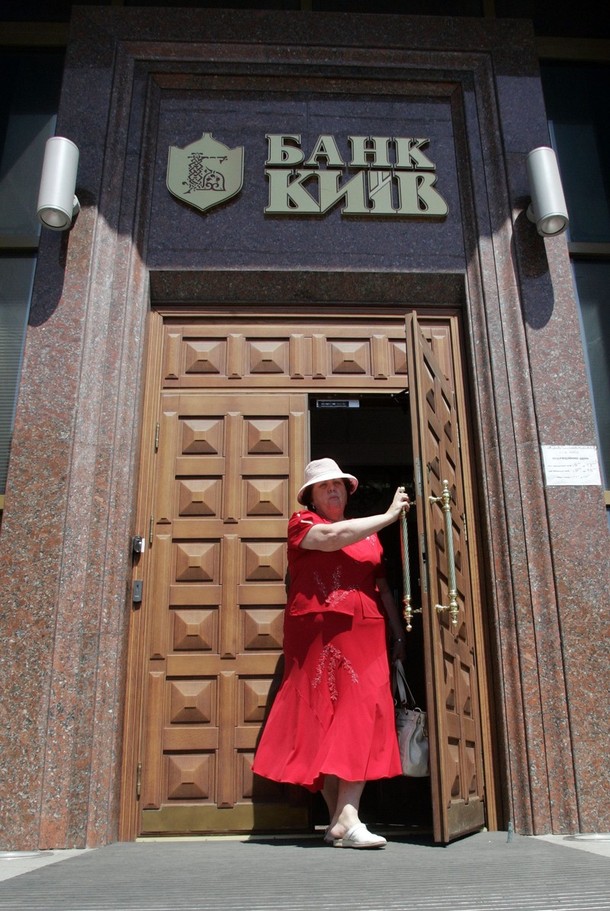
The Ukrainian Government Launches Bailout Plan for Banks
Publication: Eurasia Daily Monitor Volume: 6 Issue: 116
By:

Ukrainian Prime Minister Yulia Tymoshenko announced on June 10 that three banks will be bailed out. The state will take over stakes ranging from 84-98 percent in the mid-size banks Rodovid, Ukrgazbank and Kyiv. The government does not plan to keep the banks permanently. They will be auctioned as soon as they start to function normally, she said. The government also plans to bail out two more banks, including Nadra, which is one of Ukraine’s few large private banks not controlled by foreign capital.
Ukraine’s banking sector was among the worst hit in Europe by the global crisis. The bailout plan for the banking sector resulted from cooperation with the IMF, which pledged $16.4 billion in loans to Ukraine last November. The IMF agreed that 44 billion hryvnias ($5.8 billion) will be spent from the reserves of the National Bank of Ukraine (NBU) to bail out the ailing banks. The government will invest the equivalent of $1.26 billion in the first three banks to be bailed out, so there should still be funds to help another two or more banks. NBU Council Chairman Petro Poroshenko said the sum allotted to the three banks will be more than enough to return deposits to all their 730,000 clients (Ekonomicheskie Izvestia, June 11).
This should help the government restore trust in the banking sector, which dropped to dangerously low levels in the wake of the global financial crisis. Restoring trust in banks is the cornerstone of the anti-crisis package, which the government agreed with the IMF. The government declared its bailout plans initially for seven banks last April. Later two large banks, Imexbank and Finansy i Kredit, rejected the plan as they did not agree to pass the control of more than 75 percent of stock to the state (Kommersant-Ukraine, May 26).
Thus the number of banks to be bailed out shrank from seven to five, three of which will now be recapitalized. Nadra is probably in the worst situation of the two banks that are still in limbo. The government is not going to bail it out until after it has restructured foreign debts amounting to almost $900 million. Acting Finance Minister Ihor Umansky hopes that talks with Nadra’s creditors will be completed by the end of June (Ekonomicheskie Izvestia, June 11).
Nadra is the victim of the excessive optimism of its owners, who relied heavily on foreign loans in order to expand its network across the country to reap profits from the consumer spending boom that Ukraine experienced in 2006 and early 2008. The large retail network of Nadra suddenly became useless when the massive outflow of deposits started last fall; at the same time, many of those Ukrainians who had borrowed from Nadra in foreign currency (mostly U.S. dollars), found it difficult to repay loans as their wages in the dollar equivalent plunged when the national currency lost almost 40 percent of its value by early 2009. Nadra had been among the top five leaders in the Ukrainian mortgage loan market, and this became a heavy liability. Tymoshenko’s allegations that Nadra was illegally refinanced by the NBU at President Viktor Yushchenko’s orders were the last straw (EDM, January 30). Nadra subsequently ground to a halt as a credit institution.
There are hopes that Nadra’s well-developed network might attract foreign investors and save it from formal bankruptcy. Former NBU Governor Serhy Tyhypko, who co-chairs the council of investors under the cabinet, said in a recent interview that he found a potential Western investor for the bank in May, though he did not provide details (Ukrainska Pravda, June 15). Hundreds of thousands of Ukrainian households keep their money in Nadra, therefore Tymoshenko must prevent this bank from going under, to avoid social unrest ahead of the presidential election expected in January 2010, in which she plans to run.
Politics may still spoil everything. On June 12, parliament again asked Yushchenko to fire NBU Governor Volodymyr Stelmakh. A respective motion was backed by the overwhelming majority of 319 votes in the 450-seat chamber (Ukrainska Pravda, May 12). Yushchenko does not have to obey parliament in this matter according to the constitution, and his first reaction was to reject the motion as he did in January. However, an informed business daily suggested that Yushchenko may change his mind, jealous of the fact that relations have apparently improved between Stelmakh and Yushchenko’s arch-rival Tymoshenko, who previously insisted on his dismissal (Delo, June 15).
Stelmakh’s two main weaknesses are his political neutrality and his age of 70, five years above the legal maximum for state officials. He can only hope that Yushchenko will remain on his side, otherwise the post of the NBU governor will become a bargaining chip in the continuing war of all against all in Ukrainian politics. Changing the NBU governor at a time when the country’s banking system is in shambles might come at a very high cost, including more delays to the bailout plan that might prove fatal to banks.




